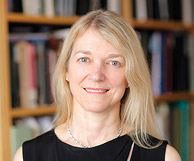 In April 2013, Rockefeller University neuroscientist Cori Bargmann was called to serve the nation by advising the U.S. government on the unprecedented "big science" project known as the BRAIN Initiative. BRAIN, in this case, stands for "Brain Research through Advancing Innovative Neurotechnologies." The White House and the National Institutes of Health recruited Dr. Bargmann to co-chair a working group whose recommendations would set a course for this large-scale, goal-driven scientific effort. Considering the sheer complexity of the human brain, with its tens of billions of neurons and trillions of neural connections, the BRAIN initiative has been compared to the Apollo space program in terms of its intensity and ambitions.
In April 2013, Rockefeller University neuroscientist Cori Bargmann was called to serve the nation by advising the U.S. government on the unprecedented "big science" project known as the BRAIN Initiative. BRAIN, in this case, stands for "Brain Research through Advancing Innovative Neurotechnologies." The White House and the National Institutes of Health recruited Dr. Bargmann to co-chair a working group whose recommendations would set a course for this large-scale, goal-driven scientific effort. Considering the sheer complexity of the human brain, with its tens of billions of neurons and trillions of neural connections, the BRAIN initiative has been compared to the Apollo space program in terms of its intensity and ambitions.
The working group that Dr. Bargmann co-chaired recently presented a ten-year, $4.5 billion plan to create new technologies, optimize existing tools, and develop the fresh analytical methods needed to study the brain’s complex operations in real time. The long-term goal is to understand the dynamic processes that enable us to observe, invent, love, dream, and express the myriad other actions, perceptions, thoughts, and emotions that distinguish us as human.
On Wednesday, December 3, Dr. Bargmann will recount her experiences leading the launch of the BRAIN Initiative, from rapid immersion into the cultures of federal agencies to the challenges of gathering intelligence from hundreds of opinionated scientific colleagues. She will also share her vision for the future of neuroscience research and the BRAIN Initiative’s transformative potential as an engine of discovery. With its ambitious approach to basic research, the initiative is expected to yield insights that can lead to improved treatments for a range of serious health conditions that affect the brain and nervous system, including autism, depression, epilepsy, schizophrenia, and stroke, as well as Alzheimer’s and Parkinson’s diseases.
Dr. Bargmann, a member of the National Academy of Sciences and an investigator with the Howard Hughes Medical Institute, was one of eleven inaugural recipients of the Breakthrough Prize in Life Sciences, the largest academic award given for research in biology and medicine. Also a recipient of the Kavli Prize in Neuroscience, she serves as co-director of The Rockefeller University’s Shelby White and Leon Levy Center for Mind, Brain, and Behavior. Dr. Bargmann was a frequent participant in the critically acclaimed series of discussions about neuroscience that aired on PBS’s Charlie Rose Show from 2009 to 2013.